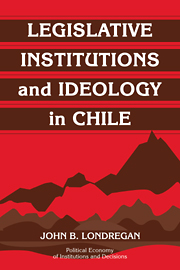Book contents
- Frontmatter
- Contents
- Acknowledgments
- Introduction
- 1 Ideology and Valence
- 2 Accident and Force
- 3 Legislative Institutions in the Constitution of 1980
- 4 Roll-Call Votes and Senate Committees
- 5 The Labor Committee
- 6 The Education Committee
- 7 The Constitution Committee
- 8 Legislative Politics and Chile's Transition Toward Democracy
- Conclusion
- A Estimating Preferences from Voting Records
- Bibliography
- Index
- Titles in the series
Introduction
Published online by Cambridge University Press: 22 October 2009
- Frontmatter
- Contents
- Acknowledgments
- Introduction
- 1 Ideology and Valence
- 2 Accident and Force
- 3 Legislative Institutions in the Constitution of 1980
- 4 Roll-Call Votes and Senate Committees
- 5 The Labor Committee
- 6 The Education Committee
- 7 The Constitution Committee
- 8 Legislative Politics and Chile's Transition Toward Democracy
- Conclusion
- A Estimating Preferences from Voting Records
- Bibliography
- Index
- Titles in the series
Summary
Constitutions provide structure for two kinds of activity: solving problems about which there is consensus, and mediating conflict over policy choices about which there is not. Moreover, the structure of constitutions is not assembled behind a Rawlesian veil of ignorance. Those who write constitutions, whether they are the elected democratic representatives of a free people or the agents of an authoritarian government, are often partisans in the policy conflicts the constitution will resolve, ready and willing to manipulate the institutional structure on behalf of their policy goals. This lack of innocence produces a tension between the problem-solving and conflict-mediating features of constitutional design. The best structures for solving problems about which there is consensus delegate considerable flexibility. This is what we see in the world of commerce; when all of the stockholders of a firm share the goal of earning higher profits, they delegate considerable decision-making authority to the company's manager. In contrast, when there is conflict about policy goals, those whose grip on power may subsequently slip will seek to “lock in” concrete policy choices, denying flexibility to future decision makers who may not share their objectives.
Yet even the most guileful partisans will perceive some cost in fully constraining future decision makers. Future politicians constrained from increasing spending on public health cannot expand medical subsidies as a way to redistribute income to the poor, but neither can they raise spending to combat an unforeseen epidemic.
- Type
- Chapter
- Information
- Legislative Institutions and Ideology in Chile , pp. 1 - 12Publisher: Cambridge University PressPrint publication year: 2000

